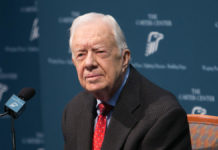I then remembered an anecdote she had once told me and I shared it with her: When my father was a newborn, Doris rocked him in her arms while their mother was busy with household chores. “Oh, George, of course, my baby brother,” she said with a pleased grin, recalling a memory that was almost a hundred years old.
It often took a while to find the right trigger, the portal into a memory clouded by age and confusion. But once there, her mental wherewithal returned in full form. It remains a great challenge for caretakers, helping our elderly loved ones experience life that, no matter the constraints and limitations, no matter the place they live, is purposeful and enriching. We have a richer vocabulary for talking with our aging relatives about their health than about their dreams. And yet, what I discovered is that Doris thrived when she could make choices about how to spend her time, maintain control over her life story, and feel that those around her respected whatever autonomy she was capable of exercising.
In “Being Mortal,” Dr. Atul Gawande reminds us that meaningfulness is central to what we yearn for, and this doesn’t stop just because we get old. I came to appreciate that meaningfulness involved dignifying Doris’s desires, feelings, memories and even aspirations. In the journal The Gerontologist, Melanie Mallers and colleagues summarize research indicating that “lack of choice and self-determination can lead to poor physical fitness, decreased social support, and depression.” The will to go on can weaken when one feels stripped of empowerment in decisions made about one’s own life.
Among the more valuable lessons I learned is that actualization is feasible for a person of even significantly advanced age. A story Doris repeatedly told me in her last few months opened my eyes to this point. It was about a vacation Doris and her mother took in the 1950s. The motel housekeeper entered their room and appeared ill. My grandmother asked why she hadn’t stayed home. She replied that she needed the money. After insisting that the housekeeper lie down in her bed, my grandmother cleaned all the rooms assigned to the housekeeper.
This story was important to Doris because she revered her mother’s altruistic nature. But it also gnawed at her, fostering lingering self-doubt. Doris saw herself as incapable of exercising kindness in the manner of her mother. Although she was generous with time, advice and financial support, she could be brusque. She lacked confidence in the softer ways we reach others, through touch and expressions of warmth. As much as the story helped Doris celebrate her mother’s memory, it was a troubling reminder that she might have fallen short.
So we talked about generosity, about what giving looks like. It comes in many forms, hers just as valued as any other. In the end, she became gracious in ways I never thought possible. She talked about family as being something to cherish, to nurture. She initiated hugs rather than stiffening through them. Her final words, as she passed from life to death, a transition of merciful seamlessness, were “thank you.”
Amy and I thought that Doris would be living with us for a very short time, and we had invited her to stay with us thinking we could lend comfort to her in her final moments. But it transformed into something none of us anticipated, bringing new meaning to her life, even at 106.
Source : Nytimes






-100x70.jpg)






